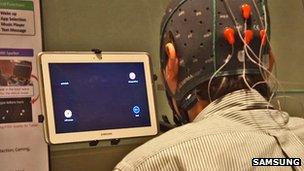Samsung works on mind-control tablet
- Published

Samsung is experimenting with a mind-controlled tablet that it hopes will shake up the way people interact with devices.
The South Korean firm, along with US researchers, has demonstrated how people can launch an application and make selections on a Galaxy tablet by concentrating on a blinking icon.
Users need to wear a cap studded with EEG-monitoring electrodes.
Such a device would be invaluable to people with mobility issues.
Playing music
Samsung's lead researcher Insoo Kim told news website MIT Technology Review, external that thought control was a natural transition for interacting with devices.
"Several years ago, a small keypad was the only input modality to control the phone, but nowadays the user can use voice, touch, gesture and eye movement to control and interact with mobile devices.
"Adding more input modalities will provide us with more convenient and richer ways of interacting with mobile devices."
Samsung's Galaxy S4 smartphone already allows users to control the screen using their eyes. Using "smart pause" the user can pause a video by looking away from the screen while another feature uses eye movements to scroll through content.
Accuracy
The smartphone maker demonstrated a person using the mind-control system to select a music application and play and pause a classical music track.
Mr Kim said that the speed with which a user can control the tablet averaged about one selection every five seconds with an accuracy of 80% to 95%.
Researchers from Samsung's Emerging Technology Lab worked with Roozbeh Jafari, an assistant professor of electrical engineering at the University of Texas.
Prof Jafari is also working on a way to make EEG headsets more user-friendly. Current caps have wet contact electrodes that require liquid to be placed between the scalp and the sensor.
He plans to develop a dry version that is also less intrusive.
Gauging mood
Technology companies are beginning to look at mind-controlled devices and there are already headsets on the market from firms such as NeuroSky and Emotiv that measure moods and allow users to interact with apps and games.
IBM is also experimenting with mind control headsets. Kevin Brown, a senior inventor at IBM's emerging technology lab, has done a series of experiments with Emotiv headsets.
"Everyone finds it incredibly hard work on focus on controlling devices," he said. One experiment in which he sent an email using mind control took 20 minutes.
"These things are nowhere near usable by the general population but these experiments give us a feeling for where the technology may take us, to help with things such as locked-in syndrome, for instance."
He also envisages a future where mind-control headsets are used to gauge moods - so a focus group may use it to get a sense of how a crowd is responding to a politician, for example.
- Published25 January 2012
- Published2 December 2010